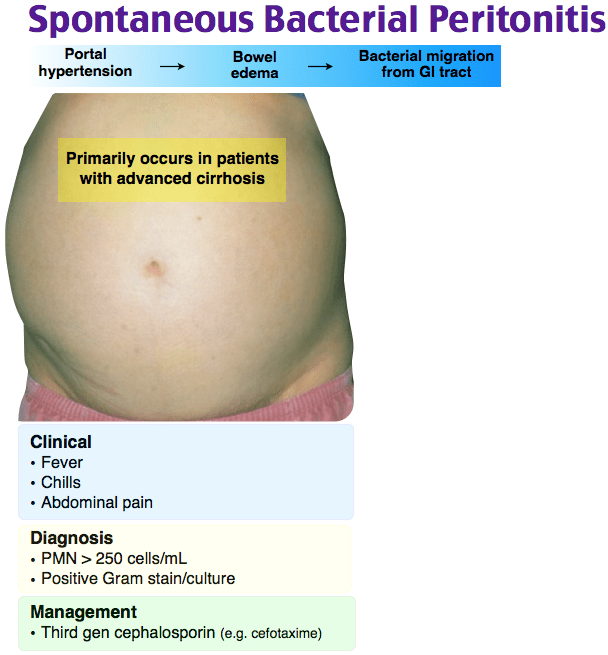The client with cirrhosis has developed spontaneous bacterial peritonitis (SBP). Which data indicates this complication of cirrhosis is occurring?
Petechiae
Increased abdominal pain
Jaundice
Blood in emesis
The Correct Answer is B
Choice A reason: Petechiae are small red or purple spots caused by bleeding into the skin, typically associated with platelet disorders, and are not a direct indicator of SBP.
Choice B reason: Increased abdominal pain is a common symptom of SBP, as the condition causes inflammation and irritation of the peritoneum, which can lead to significant discomfort.
Choice C reason: Jaundice is a sign of liver dysfunction but is not specific to SBP. It results from high levels of bilirubin in the blood and can occur in various liver diseases.
Choice D reason: Blood in emesis (vomiting) may indicate gastrointestinal bleeding, which can be a complication of cirrhosis but is not specific to SBP.

Nursing Test Bank
Naxlex Comprehensive Predictor Exams
Related Questions
Correct Answer is A
Explanation
Choice A reason: Deep brain stimulation is known to help reduce tremors in Parkinson's disease, which is one of the main symptoms that can be debilitating.
Choice B reason: While deep brain stimulation may help with some non-motor symptoms, it is not primarily used to treat urinary retention.
Choice C reason: Deep brain stimulation does not slow the progression of Parkinson's disease; it is used to manage symptoms.
Choice D reason: Deep brain stimulation is not a treatment for preventing depression, although it may improve overall quality of life.
Correct Answer is C
Explanation
Choice A reason: An oral temperature of 99.8°F (37.7°C) post-operatively may not be unusual and does not necessarily indicate a complication.
Choice B reason: A post-operative hemoglobin of 10.9 g/dL is slightly below the normal range but may be expected after surgery due to blood loss.
Choice C reason: A client reporting a pressure sensation at the incision site could indicate bleeding or swelling under the incision, which can be a sign of a hematoma, a serious complication that needs immediate attention.
Choice D reason: Pain at the incision site is expected post-operatively and can be managed with pain relief measures.
Whether you are a student looking to ace your exams or a practicing nurse seeking to enhance your expertise , our nursing education contents will empower you with the confidence and competence to make a difference in the lives of patients and become a respected leader in the healthcare field.
Visit Naxlex, invest in your future and unlock endless possibilities with our unparalleled nursing education contents today
Report Wrong Answer on the Current Question
Do you disagree with the answer? If yes, what is your expected answer? Explain.
Kindly be descriptive with the issue you are facing.
